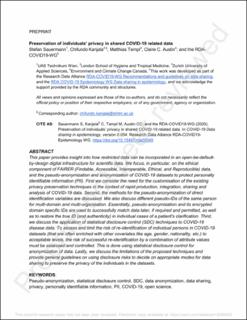Please use this identifier to cite or link to this item:
https://doi.org/10.21256/zhaw-22019| Publication type: | Working paper – expertise – study |
| Title: | Preservation of individuals’ privacy in shared COVID-19 related data |
| Authors: | Sauermann, Stefan Kanjala, Chifundo Templ, Matthias Austin, Claire C. |
| et. al: | No |
| DOI: | 10.2139/ssrn.3648430 10.21256/zhaw-22019 |
| Extent: | 13 |
| Issue Date: | 17-Jul-2020 |
| Publisher / Ed. Institution: | SSRN |
| ISSN: | 1556-5068 |
| Language: | English |
| Subjects: | Covid-19; Anonymisation |
| Subject (DDC): | 005: Computer programming, programs and data |
| Abstract: | This paper provides insight into how restricted data can be incorporated in an open-be-default-by-design digital infrastructure for scientific data. We focus, in particular, on the ethical component of FAIRER (Findable, Accessible, Interoperable, Ethical, and Reproducible) data, and the pseudo-anonymization and anonymization of COVID-19 datasets to protect personally identifiable information (PII). First we consider the need for the customisation of the existing privacy preservation techniques in the context of rapid production, integration, sharing and analysis of COVID-19 data. Second, the methods for the pseudo-anonymization of direct identification variables are discussed. We also discuss different pseudo-IDs of the same person for multi-domain and multi-organization. Essentially, pseudo-anonymization and its encrypted domain specific IDs are used to successfully match data later, if required and permitted, as well as to restore the true ID (and authenticity) in individual cases of a patient's clarification.Third, we discuss application of statistical disclosure control (SDC) techniques to COVID-19 disease data. To assess and limit the risk of re-identification of individual persons in COVID-19 datasets (that are often enriched with other covariates like age, gender, nationality, etc.) to acceptable levels, the risk of successful re-identification by a combination of attribute values must be assessed and controlled. This is done using statistical disclosure control for anonymization of data. Lastly, we discuss the limitations of the proposed techniques and provide general guidelines on using disclosure risks to decide on appropriate modes for data sharing to preserve the privacy of the individuals in the datasets. |
| Further description: | Preprint Version |
| URI: | https://digitalcollection.zhaw.ch/handle/11475/22019 |
| License (according to publishing contract): | Licence according to publishing contract |
| Departement: | School of Engineering |
| Organisational Unit: | Institute of Data Analysis and Process Design (IDP) |
| Appears in collections: | Publikationen School of Engineering |
Files in This Item:
| File | Description | Size | Format | |
|---|---|---|---|---|
| 2020_Sauermann-etal_Preservation-of-individuals-privacy.pdf | 488.04 kB | Adobe PDF |  View/Open |
Show full item record
Sauermann, S., Kanjala, C., Templ, M., & Austin, C. C. (2020). Preservation of individuals’ privacy in shared COVID-19 related data. SSRN. https://doi.org/10.2139/ssrn.3648430
Sauermann, S. et al. (2020) Preservation of individuals’ privacy in shared COVID-19 related data. SSRN. Available at: https://doi.org/10.2139/ssrn.3648430.
S. Sauermann, C. Kanjala, M. Templ, and C. C. Austin, “Preservation of individuals’ privacy in shared COVID-19 related data,” SSRN, Jul. 2020. doi: 10.2139/ssrn.3648430.
SAUERMANN, Stefan, Chifundo KANJALA, Matthias TEMPL und Claire C. AUSTIN, 2020. Preservation of individuals’ privacy in shared COVID-19 related data. SSRN
Sauermann, Stefan, Chifundo Kanjala, Matthias Templ, and Claire C. Austin. 2020. “Preservation of Individuals’ Privacy in Shared COVID-19 Related Data.” SSRN. https://doi.org/10.2139/ssrn.3648430.
Sauermann, Stefan, et al. Preservation of Individuals’ Privacy in Shared COVID-19 Related Data. SSRN, 17 July 2020, https://doi.org/10.2139/ssrn.3648430.
Items in DSpace are protected by copyright, with all rights reserved, unless otherwise indicated.